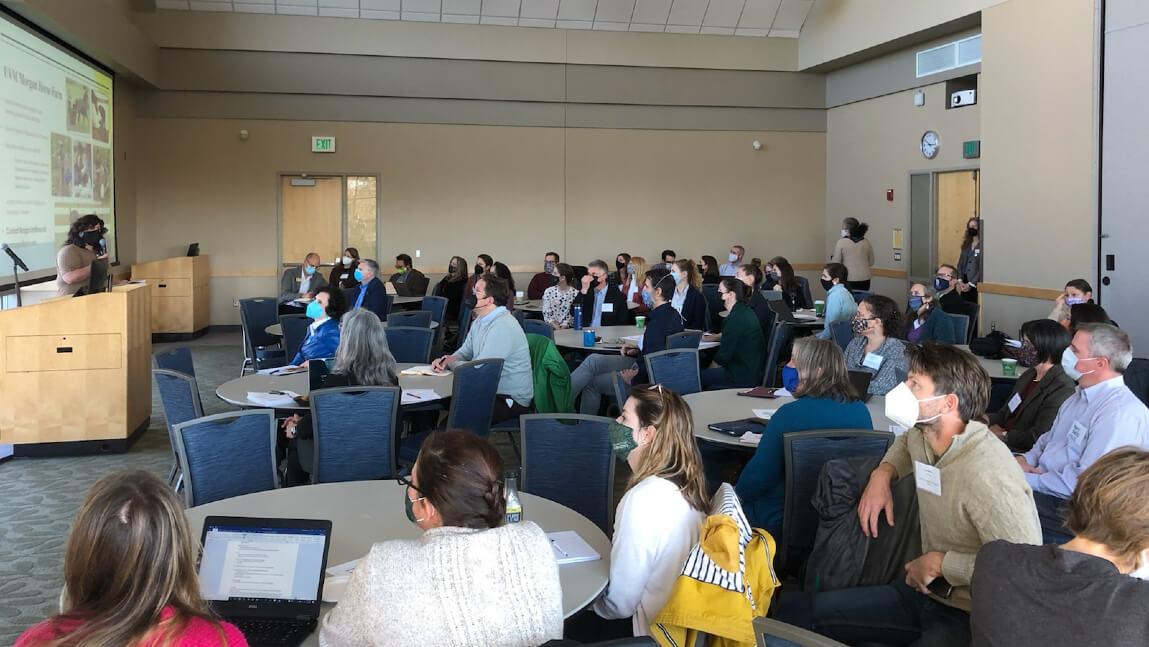On November 10, 2021, the first ever “One UVM” Experiential Learning Summit was held on campus involving over 50 UVM faculty and staff members. Provost Patricia Prelock spoke of the value of experiential learning to the achievement of the university’s academic success goals, and laid out a goal of having 100% of our students engaged in high impact practices.
“Based on the valuable discussions at the summit, we decided to develop new internships that support the ‘One UVM’ approach,” said Provost Prelock. “That includes expanded access by removing financial barriers to students, increased efficiency in how we implement processes, and improved student success through promoting career readiness.”
The Office of the Provost, the Office of Engagement, and the Career Center invited applications to support the development of “One UVM” internships. They are pleased to report the results of this project: six fully-funded internship experiences for undergraduate or graduate students in 2022.
1. Community Development and Applied Economics (CDAE) & Food Systems (CALS). Alie Sarhanis, with the support of CALS Associate Dean Finley Woodruff, was awarded $1,750 to expand food systems/rural development internship offerings with internal and external CALS partnerships including UVM Extension, CALS Communications, The Center for Rural Studies, the Vermont Agency of Agriculture, and the Farm to Plate Network.
2. Public Health Sciences (CNHS). Deb Hinchey, with support from Associate Deans Paula Deming and Jeremy Sibold, was awarded $5,000 to develop a summer internship program in public health, financing a faculty stipend and faculty travel to secure internship sites. The internship placements include rural partnerships and provides a planned and supervised opportunity for students to work on a meaningful project related to health equity, health disparities, health education/promotion, management, advocacy, delivery, or some other aspect of health systems/services.
3. Spatial Analysis Lab (SAL) (RSENR). Jarlath O’Neil-Dunne, with support from Assistant Dean Marie Vea, was awarded $5,000 to support staff time for targeted recruitment and training to better support BIPOC interns. This proposal seeks to enhance the diversity of the SAL’s internship program through targeted recruitment, virtual training, and expanded partnerships.
4. CAS Community of Practice (CoPs) (CAS). Richard Watts, with support from Dean Bill Falls, was awarded $5,000 to fund a student research intern to conduct CAS CoPs internship program assessment and identify areas to expand. This proposal features hiring a student intern to conduct this program assessment.
5. Sustainable Solutions Lab (SSL) Internship Program. Elizabeth Palcheck in the Office of Sustainability was awarded $5,000 to fund faculty time to connect Comprehensive Sustainability Plan (CSP) outcomes to the student intern research projects. The SSL internship program will connect students to research questions developed in partnership with a faculty lead, operational or other relevant staff, and outside partners or other strong collaborators.
6. Plant Biology (PBIO). Laura Hill, with the support from Associate Dean Finley Woodruff, was awarded $4,680 to create a summer internship (PBIO 291 expanding off of the existing spring course PBIO 290), allowing life science students a non-research experiential learning opportunity.
Each internship uses approaches that set explicit learning and career development goals using the common language of the NACE Career Readiness Competencies. The National Association of Colleges and Employers (NACE) presents the competencies in a format that is recognized and used across institutions.
The “One UVM” Internship Enhancement Initiative is led by the Office of Engagement and the UVM Career Center, with funding from the Office of the Provost.
